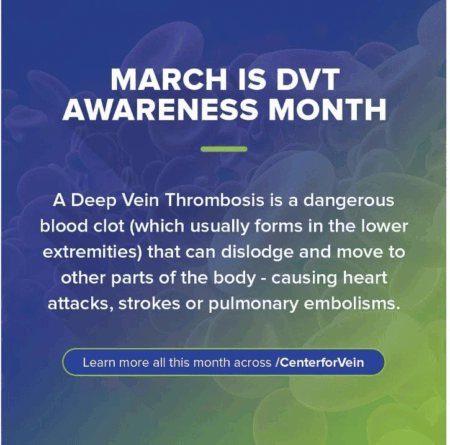
MARCH 2020, Greenbelt, MD: For the sixth year in a row, Center for Vein Restoration (CVR) will be participating in national Deep Vein Thrombosis (DVT) Awareness Month. According to the American Heart Association, over 2.5 million Americans are affected by DVT annually, with over 600,000 people hospitalized each year. DVT, with its risk of pulmonary embolism, may be the most preventable cause of death among people hospitalized today in the United States. Despite its prevalence, many Americans are still unaware of the threat DVTs pose to their health.
Raising awareness of this epidemic is important to the work of physicians across CVR. Chronic venous insufficiency, or vein disease, is more likely in patients that have had a DVT, and DVTs are one possible side effect of late stage vein disease. The initial symptoms and risk factors for each condition are also similar. Early detection of DVTs is essential for successful treatment, and the vein disease screenings provided to each CVR patient can help identify DVTs.
Everyday, in its 84 practices across the nation, CVR provides DVT rule-out ultrasounds to patients referred by physicians who suspect a DVT but want to save their patients a costly, long, and stressful trip to the emergency room. CVR can also provide an immediate treatment plan for the DVT, or additional screening for vein disease, if needed.
CVR physicians educate about DVTs as a possible side effect of vein disease year-round. As part of CVR’s re-commitment to DVT Awareness Month in 2020, the company will be:
Dr. Khanh Q. Nguyen, the Chief Medical Officer at CVR, is proud to lead CVR’s DVT Program. “Since 2014, we’ve managed over 3,000 DVT patients in the outpatient setting safely,” says Dr. Nguyen. “We are committed to providing state of the art venous care and complete DVT management while maintaining close communication with the referring physician.”
DVT Awareness Month was established in 2003 and sponsored by the Coalition to Prevent Deep-Vein Thrombosis. March is officially recognized as Deep-Vein Thrombosis (DVT) Awareness Month by United States Senate Resolution 56.
For more on CVR’s awareness campaign, follow:
ABOUT DEEP VEIN THROMBOSIS
A Deep Vein Thrombosis (DVT) is a dangerous blood clot that can form in the leg veins, or in other places in the body. The clot can be dislodged and move to othe veins and arties, causing heart attack, stroke or plumonary embolism. Clots form when circulation is hindered by thick blood, genetic or hormonal factors, slow blood flow, inactivity or damaged veins. DVTs are most common in adults over age 60, but can occur at any age. Blood is more likely to clot, and vein valves are more likely to fail, for moms and pregnant women, smokers, long-distance travelers and those taking birth control pills, among other risk factors.
ABOUT VENOUS INSUFFICIENCY
Venous insufficiency, the cause of significant suffering due to the sequelae of venous hypertension, most commonly arises as achy, tired and heavy legs. It may or may not be associated with varicose veins, spider veins or skin changes including venous ulcerations and indiscriminately affects between 30–40 million Americans. Numerous factors including age, weight, prolonged sitting or standing, genetics or a history of DVT (blood clots) can increase the risk of developing this common and often underdiagnosed disorder. Treatment options have evolved to an array of minimally invasive procedures in an office setting.
ABOUT CENTER FOR VEIN RESTORATION
Center for Vein Restoration (CVR) is the largest physician-led practice treating vein disease in the country. Having performed its first procedure in 2007 under President and CEO Dr. Sanjiv Lakhanpal, Center for Vein Restoration has since become nationally recognized as the clinical leader in treating chronic venous insufficiency. With 84 centers and growing, CVR has over 500 employees and conducts over 200,000 patient interactions annually. To learn more about CVR and its mission, visit www.centerforvein.com or by phone at 240-965-3915.